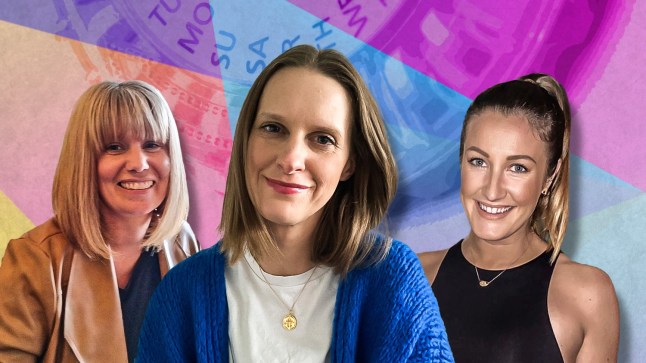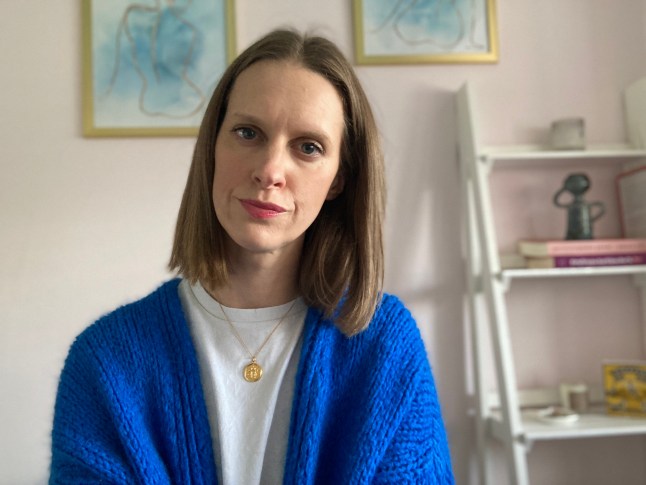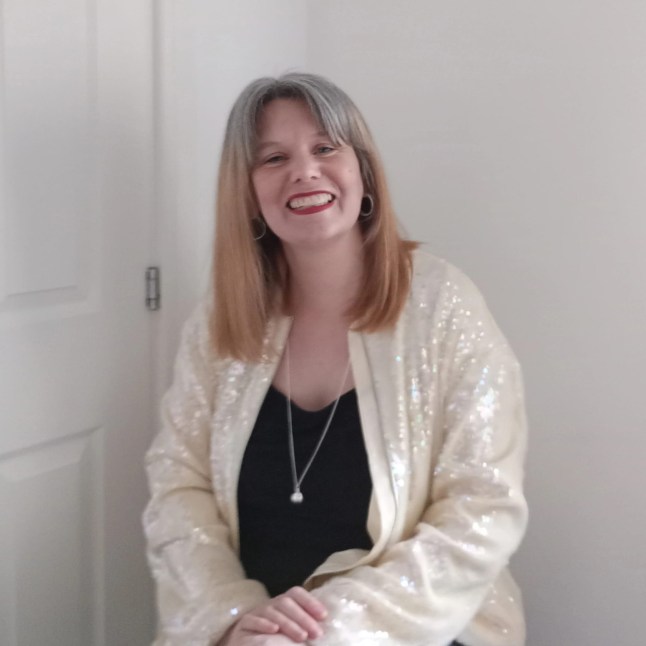
When Kendal-Rose Horner was in her twenties she was prescribed four different types of antidepressants in a bid to combat persistent angry outbursts and depressive episodes. None of them worked.
As she hit her thirties things only worsened and Kendal-Rose began to endure headaches, joint pain, restless legs, extreme fatigue, and sleep troubles.
‘I had to stop working,’ the 36-year-old tells Metro. ‘I couldn’t focus. I’d sit down at my desk in the morning and ask myself what I was meant to be doing. I didn’t know how to function.’
So extreme was Kendal-Rose’s ‘annoyance and frustration’ at the situation, she felt suicidal at times.
Kendal-Rose was sure her depression was a byproduct of something more and when she heard about premenstrual dysphoric disorder (PMDD) in 2021, she wondered whether the disorder could be the root cause and booked an appointment with a private gynaecologist.
Much to her disappointment, she was prescribed a contraceptive patch in the hope it would help regulate her hormones, but the reality was it made no difference. ‘I just didn’t feel heard. There’s only so many times you can keep going to the doctors for them to say the same thing,’ she remembers.
After a further three years, Kendal-Rose booked another appointment – this time with a different gynaecologist, who prescribed her hormone replacement therapy (HRT).

‘I felt listened to for the first time in 15 years. It was a relief, but I also wondered what it meant,’ she recalls. ‘I thought HRT was for older women going through menopause – an age I felt so far from.’
Misconceptions around HRT
HRT is often thought of as a drug to treat menopausal women in their late 40s, 50s and beyond, however, it is increasingly being prescribed to those who may have previously been considered too young.
‘As soon as someone under 40 mentions taking HRT, people think you shouldn’t be on it,’ Dr Deepali Misra-Sharp, a Birmingham GP partner and Clinical Lead for Women’s Health, tells Metro. ‘But younger women can have symptoms related to low hormone levels, menopause, surgical menopause, and ovarian failure, which HRT can help manage.
‘While there aren’t official national figures broken down by exact age group, we do know from NICE guidance and British Menopause Society data that around 1 in 100 women under 40 in the UK experience premature ovarian insufficiency (POI) — when the ovaries stop functioning earlier than expected,’ explains Dr Misra-Sharp.
‘These women are usually advised to take HRT until at least the average age of menopause, which is around 51, to protect their bones, heart, and brain. Despite this, hormone replacement therapy is still under-prescribed in this group, often because POI is under-recognised or misdiagnosed.
‘Many younger women are simply told they’re “too young” for menopause, when in fact they need tailored hormonal support.’
After being prescribed HRT in the form of an oestrogen gel, Kendal-Rose says that although it’s not perfect, she has also seen some positive changes. ‘I have a lot more energy, my lows are not as low, headaches are less frequent, and sleep is better,’ she explains. ‘There are still symptoms creeping in, but it is working.’
HRT EXPLAINED
What is HRT?
HRT stands for hormone replacement therapy. It replaces the oestrogen your body stops making during menopause. That drop in hormones can cause a wide range of symptoms — hot flushes, brain fog, anxiety, joint pain, low mood — and HRT can ease those while also helping protect your bones and heart in the longer term.
Taking HRT
According to the NHS, hormone replacement therapy can be administered in different ways – tablets, patches, gel, spray or vaginal rings, pessaries or cream.
Different types contain varying hormones: oestrogen, progestogen or both (a specialist doctor may also sometimes prescribe testosterone), which can be taken cyclically or continuously.
Get support
If you’re considering taking HRT, talk to a GP about the options suitable for you, or visit the British Menopause Society .
‘It’s a case-by-case approach’
Dr Misra-Sharp warns that it’s essential a woman is not ‘left on’ HRT without regular reviews with her doctor, who can ask questions about breast screenings, smear tests, abnormal bleeding, or any other symptoms that might be out of the ordinary.
‘It’s a case-by-case approach,’ she explains. ‘Once you’re prescribed something, it isn’t set in stone. If something isn’t working, you can tinker around to adjust things.’
However, she warns, some generalist GPs, who don’t have expertise in women’s health, might be hesitant to prescribe HRT to younger women.
‘This is where a lot of problems are coming in at the moment,’ Dr Misra-Sharp explains. ‘I know of a practice where the GPs will only go by what is licensed or in the guidelines. Anything outside of that – even if you have symptoms – you’ll have to see someone privately. That’s the ditch women tend to find themselves in.’
Feeling dismissed
Six months ago, Hannah Wrathall noticed an ‘uncomfortable’ feeling in her vulva area. ‘It wasn’t just an itch – it felt raw,’ the 38-year-old tells Metro. ‘I was visibly scratching. There were times I just couldn’t stop. It started to affect my sex life because it was so uncomfortable.’

Growing increasingly anxious, she visited a GP but was met with little sympathy. ‘The doctor was quite dismissive. In my notes, he wrote I was having health anxiety,’ she recalls.
After living with extreme discomfort for three months Hannah — who is the founder of women’s health consultancy Wrapp Consulting — decided to book herself in with a women’s specialist GP. ‘Within five minutes, she asked if I had heard of perimenopause,’ she remembers, adding that hearing those words came as quite a shock as she was still having regular periods.
‘It made me feel conscious of my age,’ explains Hannah. ‘Although I have two children and no plans for more, I did feel sad that I could be perimenopausal.’
The GP diagnosed herwith Genitourinary Syndrome of Menopause (GSM) – when the walls of the vagina thin due to decreased oestrogen levels – something common in perimenopause and menopause. To treat it, Hannah was advised to use vaginal oestrogen, and since then the itching has mostly subsided.
Accepting she is perimenopausal, Hannah is remaining vigilant for other symptoms. ‘If anything changes, I’m definitely open to other HRT options,’ she says. ‘I’m keen to explore all the things I can do to support this life stage. Menopause can be devastating but it doesn’t have to be that way.’
HRT for endometriosis

It was after having her first daughter at the age of 18, that Michelle Leivars first started suffering from severe gynaecological pain.
‘It was so bad I was having to crawl up the stairs,’ the 39-year-old tells Metro.
After nearly a year of suffering, Michelle saw a male doctor who told her she was ‘being silly’ and had probably pulled a ligament in her stomach.
‘I knew that wasn’t right,’ the mum-of-two remembers. ‘I went on to suffer for nearly a decade before finally getting a diagnosis of endometriosis.’
To ease her symptoms, it was suggested Michelle opt for sterilisation and have a Mirena coil fitted, which she did at the start of 2015. ‘But I started having ridiculously heavy, agonising periods where I was passing loads of clots,’ she remembers.
Fearing she’d had a miscarriage, her doctor advised a total abdominal hysterectomy – removing her womb, remaining ovary and cervix – which would put Michelle into menopause at 29.
‘I was told I would need to go on HRT straight away to avoid getting osteoporosis,’ she remembers. ‘I was given it as I was leaving the hospital after the surgery and I just did what I was told.’
Using just oestrogen patches, Michelle suffered from hot flashes, constant headaches, and low moods for more than six months. She tried antidepressants to see if they could make a difference but to no avail.
‘I cried all the time, but I didn’t know if it was because of hormones or because of the loss of my womb. I still really don’t know,’ admits Michelle.
What’s the alternative?
Health shops sell a variety of products to treat menopause symptoms, but according to the NHS, they’re not tested and regulated in the same way as HRT, so it’s not known how safe and effective they are.
They recommend speaking to a GP or pharmacist for advice if you’re thinking about using a complementary therapy. Some of the herbal remedies that are taken for menopause symptoms include: Red clover, evening primrose oil, black cohosh, angelica, ginseng and St John’s wort.
The NHS also advises regular exercise to reduce hot flushes and improve sleep, along with a balanced diet to keep your bones healthy. They also suggested cutting down on caffeine, alcohol and spicy food – they have all been known to trigger hot flushes.
She has since been prescribed progesterone tablets, after being recommended them by a menopausal friend, and Michelle says she is finally sleeping ‘for the first time in six years.’
She continues: ‘I feel like my mood has lifted a bit more too. After a decade, I may be finally getting the balance right.’
However, Michelle adds that being on HRT is still a complicated issue for her. Reflecting on all her years of ‘suffering’, she wishes she’d have advocated more for herself, and demanded more information.
‘In an ideal world, I would go down the natural route and see what’s out there, but I have this fear that I have no choice but to be on hormone replacement therapy otherwise I will get osteoporosis. I’m too scared to risk it,’ she admits.
For Dr Misra-Sharp, there are still far too many ‘myths’ surrounding HRT. While some have been called into question in recent years thanks in part to celebrities like Davina McCall and Lorraine Kelly, she feels more needs to be discussed about its usage in the under 40s.
‘The myths exist when there is a lack of knowledge,’ she adds. ‘We’ve come a long way since HRT was unfairly demonised. For many women, it can be the difference between surviving and truly living.
‘Too many are told their symptoms are “just part of ageing” but we now have strong evidence that HRT, when used appropriately, is both safe and effective. It’s not about chasing youth, it’s about restoring balance, protecting long-term health, and giving women back the clarity, confidence and vitality they deserve.’
Metro has approached NHS England for comment.
Do you have a story you’d like to share? Get in touch by emailing Claie.Wilson@metro.co.uk
Share your views in the comments below.
MORE: ‘I attempted Britain’s biggest robbery worth £350,000,000 so I could renovate my house’
MORE: ‘I drove 18,000 treacherous miles from UK to South Africa for touching reason’
MORE: Tesco becomes first UK supermarket to make major aisle change in 93 stores














